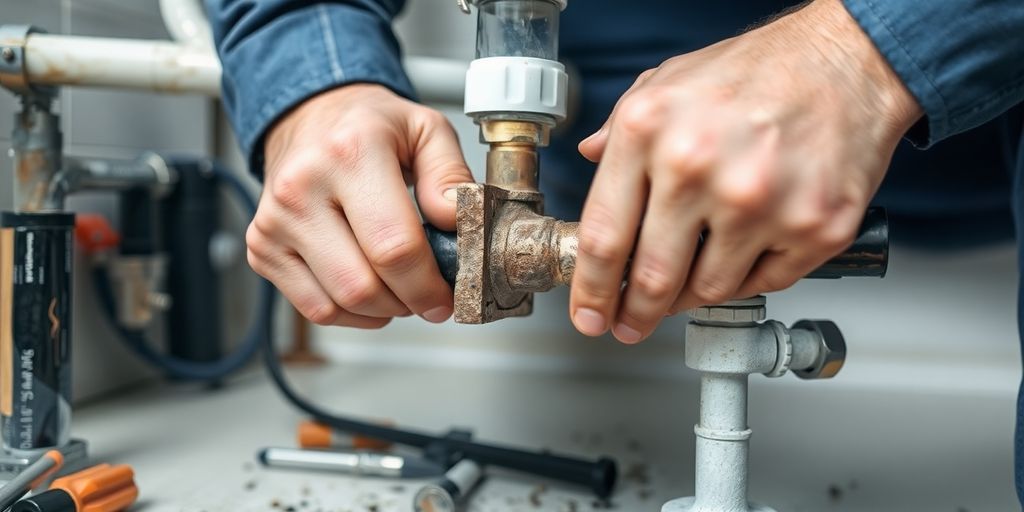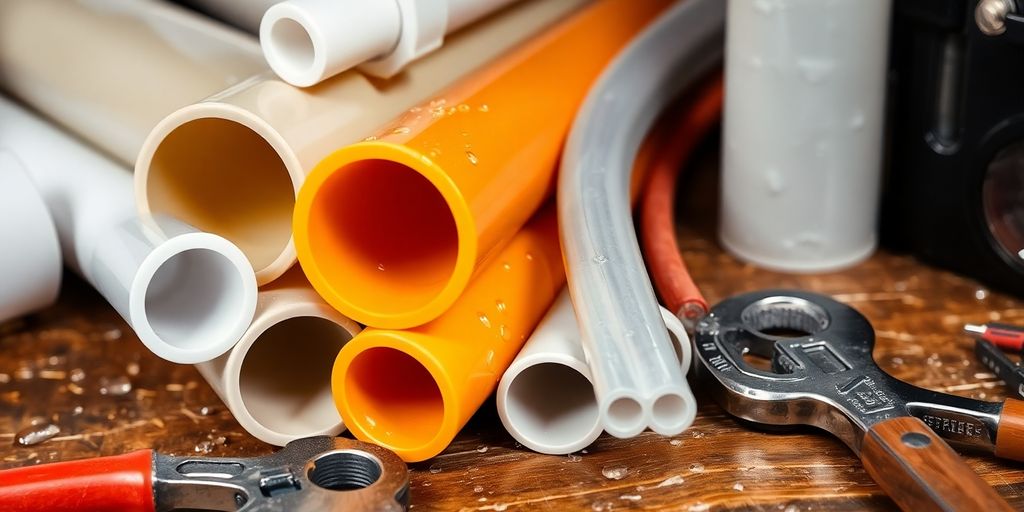
Dealing with a burst pipe in Calgary can be quite a hassle. Whether it’s from freezing temperatures or just old pipes, knowing how to tackle the issue is key. You have two main options: repair the damaged section or replace the entire pipe. In this article, we’ll break down everything you need to know about fixing a burst pipe in Calgary, including when to repair versus when to replace, and how to prevent future problems. Let’s get started!
Burst pipes are a headache no one wants, especially when Calgary’s weather throws its curveballs. You might think it’s always about the deep freeze, but there’s more to it. Ageing pipes are a big factor; materials degrade over time, becoming weaker and more prone to cracking. Then there’s the water pressure – too high, and it puts constant stress on your plumbing. And yes, those Calgary winters definitely play a role. When water freezes, it expands, and that expansion can cause pipes to burst, especially if they’re already weakened.
Ignoring minor leaks or drips can lead to bigger problems down the road. Regular checks can save you from major headaches.
Catching a burst pipe early can save you a lot of trouble and money. Obvious signs include water gushing from a wall or ceiling, but sometimes it’s more subtle. Keep an eye out for these:
Also, be alert for damp spots, mold growth, or the sound of running water when everything is turned off. And don’t dismiss a sudden increase in your water bill – it could be a sign of a hidden leak.
Okay, so you suspect you have a burst pipe. Time is of the essence. First, shut off the main water supply to your house. This will minimize the damage. Then, call a plumber – like us at My Calgary Plumber – right away. While waiting, try to contain the water as much as possible with towels and buckets. If there’s any electrical equipment near the water, turn off the power to that area to avoid shocks.
Burst pipes are a headache, plain and simple. But knowing what to do can save you a lot of stress and money. Let’s walk through the steps you should consider when dealing with a burst pipe.
First things first, you need to figure out how bad the damage really is. Is it a small pinhole leak, or has the pipe completely split? The extent of the damage will dictate your next steps. Check not just the immediate area around the burst, but also any surrounding walls, floors, or ceilings for signs of water damage. Look for discoloration, dampness, or even mold. A thorough assessment now can prevent bigger problems later.
Okay, so you’ve got a burst pipe and you’re waiting for a plumber. What can you do in the meantime? Here are a few temporary fixes to minimize the damage:
Remember, these are temporary fixes only. They’re meant to buy you some time until a professional can arrive. Don’t rely on them as permanent solutions.
Let’s be honest, some plumbing jobs are best left to the pros. Here’s when you should definitely call My Calgary Plumber:
Calling a professional plumber ensures the job is done right, preventing future issues and potential water damage.
Deciding whether to repair or replace a burst pipe can feel overwhelming. You’re probably thinking about costs, the hassle, and what’s best for your home in the long run. Let’s break down the key factors to help you make an informed decision.
Cost is often the first thing on everyone’s mind. A simple repair is almost always cheaper upfront. However, consider the potential for future problems. If your pipes are old or corroded, a repair might only be a temporary fix, leading to more expenses down the road. Replacement, while a bigger investment initially, could save you money in the long run by preventing future bursts and related damage.
Think about the age and condition of your existing plumbing. If the burst pipe is an isolated incident and your pipes are relatively new, a repair might be sufficient. However, if you’re dealing with older pipes that are showing signs of widespread corrosion or deterioration, replacement is often the wiser choice. Replacing your pipes offers a long-term solution, reducing the risk of future leaks and bursts. It also gives you the opportunity to upgrade to more durable and efficient materials like PEX, which are less prone to bursting in freezing temperatures.
Replacing old, problematic pipes can actually increase your property value. Potential buyers will appreciate the peace of mind that comes with knowing the plumbing system is in good condition. A history of frequent repairs, on the other hand, might raise red flags and deter buyers. While a repair might seem like the easier option now, consider how it might affect your home’s value if you plan to sell in the future.
Choosing between repair and replacement isn’t always straightforward. It depends on the specific situation, the age of your pipes, and your long-term goals for your home. When in doubt, it’s always best to consult with a qualified plumber who can assess the situation and provide expert advice tailored to your needs.

Finding the right plumber in Calgary can feel overwhelming, especially when dealing with a burst pipe. You want someone reliable, experienced, and fairly priced. It’s not just about fixing the immediate problem; it’s about ensuring the long-term health of your plumbing system. Let’s explore how to make the best choice.
When selecting a plumber, several factors should influence your decision. Experience is key. You want someone who has dealt with burst pipes before and understands the unique challenges they present in Calgary’s climate. Here’s a quick checklist:
Choosing a plumber is a big decision. Don’t rush it. Take the time to research your options and find someone you trust.
Before hiring a plumber, it’s wise to ask some pointed questions. This will help you gauge their expertise and ensure they’re the right fit for your needs. Consider these:
Plumbing costs can vary widely depending on the extent of the damage, the complexity of the repair, and the plumber’s rates. Be sure to get a clear understanding of the costs involved before authorizing any work. Here’s what to keep in mind:
To keep your plumbing in good shape and avoid future burst pipes, regular maintenance is key. It’s not just about fixing things when they break; it’s about preventing the breaks in the first place. Think of it like taking your car in for an oil change – you’re not waiting for the engine to seize, you’re proactively ensuring it runs smoothly. Here are a few things you can do:
Regular maintenance might seem like a chore, but it’s a small price to pay compared to the cost and hassle of dealing with a burst pipe. A little prevention goes a long way.
Calgary winters can be brutal, and your pipes are vulnerable to freezing temperatures. When water freezes, it expands, and that expansion can cause pipes to burst. Insulating your pipes is a simple and effective way to protect them. Here’s what you need to know:
High water pressure can put a lot of stress on your plumbing system, increasing the risk of leaks and bursts. Monitoring your water pressure is a simple way to identify potential problems before they become major headaches. Here’s how to do it:

When it comes to plumbing materials, copper and PEX (cross-linked polyethylene) are two of the most common choices in Calgary. Copper has been a long-standing favorite due to its durability and resistance to corrosion. However, PEX has gained popularity because it is more flexible and resists freezing temperatures better than copper. It’s also worth noting that PEX doesn’t cause water hammer issues like copper can.
Older homes in Calgary often have plumbing systems made from materials that are no longer considered ideal. Cast iron, clay, and even Orangeburg pipes were common before the 1970s. These materials are prone to various issues, including:
If you live in an older home, it’s a good idea to have your plumbing system inspected to identify any potential problems before they lead to a burst pipe.
Selecting the right pipe material is a critical decision that impacts the longevity and reliability of your plumbing system. Consider factors such as your budget, water quality, and the climate in Calgary when making your choice. Here’s a quick comparison:
Ultimately, the best material depends on your specific needs and circumstances. Consulting with a professional plumber can help you make an informed decision.
Dealing with a burst pipe is stressful enough, but navigating the insurance claim process can feel overwhelming. Let’s break down what you need to know to make the process smoother.
Documenting the damage is the first crucial step. Thorough documentation will significantly aid your insurance claim.
Accurate and comprehensive documentation is your best defense when filing an insurance claim. It provides concrete evidence of the damage and helps the insurance company assess the extent of the loss.
Once you’ve documented the damage, it’s time to file a claim with your insurance provider. Here’s what you should do:
Working with your insurance provider can be a collaborative process. Here’s how to approach it:
Burst pipes can cause significant damage, but with proper documentation and a clear understanding of the claims process, you can navigate the insurance process with confidence. And remember, My Calgary Plumber is here to help with the repairs and provide any necessary documentation to support your claim.
If a pipe bursts in your home, it can cause a lot of damage. Luckily, your insurance might help cover the costs of repairs. Make sure to check your policy and understand what is covered. If you need help with a burst pipe claim, visit our website for more information and support. Don’t wait until it’s too late!
Dealing with a burst pipe in Calgary can be a real headache, but knowing your options can make things a bit easier. Whether you decide to repair or replace, it’s important to act fast to prevent more damage. If you’re not sure what to do, don’t hesitate to call in the pros. They’ve got the tools and know-how to get the job done right. Remember, keeping your plumbing in good shape is key to avoiding these issues in the future. So, stay alert and take care of those pipes!
Pipes can burst due to cold weather, aging materials, or high water pressure. In Calgary, freezing temperatures are a common cause.
Look for signs like water stains on walls, a sudden drop in water pressure, or water pooling in your basement.
Turn off the main water supply, drain the pipes by opening faucets, and call a plumber for help.
It depends on the damage. Minor issues can often be repaired, but extensive damage may require a full replacement.
Repair costs can vary widely, but you might expect to pay between $250 and $5,000 depending on the damage.
Many home insurance policies cover water damage from burst pipes, but it’s best to check your policy details.